Our Experiences as Speakers at the Grace Hopper Conference

On October 1, 2019, more than 25,000 attendees gathered in Orlando, Florida for the Grace Hopper Celebration. As the world’s largest conference for women in computing, the five-day event hosted panels, mentoring sessions, an open-source codeathon, and talks on subjects ranging from technology trends to fostering diversity and inclusion in computer science. One such panel was “Navigating the Tech Scene With a Disability.” Moderated by Dr. Brianna Blaser from AccessComputing, the panel featured us, Meenakshi Das, a masters student at Auburn University, and Naba Rizvi, a senior at the University of Toledo; Lauren Siegel, a senior at North Carolina State University; and Rebecca Krieger, a program manager at Microsoft. The panelists discussed how to navigate disabilities in the context of education and employment. Women with disabilities are a double minority in computer science and often feel they do not fit into the technology scene. This panel attempted to foster discussions among not only women with disabilities but also provide advice to universities and companies on how they may better support people with disabilities.
The panel focused mainly on access and inclusion in education and the workplace. Some of the topics discussed included asking for accommodations in the workplace, disability disclosure, and how to change society’s perception of people with disabilities. One panelist shared her personal experiences with having others doubt her fluency in English due to her speech impairment. Another panelist recalled other people’s surprise in discovering she is a computer science major with a vision impairment. Mental health-related disabilities were also discussed and tips were shared on how to strategically approach these topics with employers and faculty.
Additionally, there was an open dialogue about making conferences such as the Grace Hopper Celebration more accessible. Examples of desirable accommodations at conferences included having live captioning and sign language interpretation available for deaf and hard-of-hearing attendees, placing signs and maps lower to make them more accessible for attendees in wheelchairs, and providing sighted guides for blind and low vision attendees. Guidance on how to approach interview accommodations like extra time, different modes of communication, and alternative methods of technical interviewing were also given.
The panel received excellent feedback from the audience, many of whom stayed back for further questions and networking with panelists. The importance of hosting similar events in the future to center the voices of people with disabilities in conversations regarding diversity and inclusion was emphasized by both the panelists and the audience. As stated by one of the panelists, Lauren Siegel, “it's not just about making a single event more accessible, it's about changing our society's attitudes toward people with disabilities.” Panels such as this are paving the way for a more inclusive society.